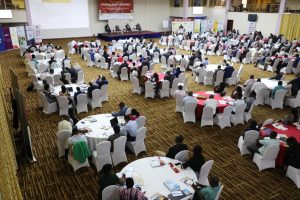By Racheal Amuge,
KAMPALA
Prof. Ezra Suruma, former Deputy Governor of the Bank of Uganda, has called on Ugandans to persist in their pursuit of economic and financial independence, warning that external forces are working to keep the country economically disadvantaged.

Addressing the 9th Annual National SACCO Conference at Hotel Africana on Thursday, Prof. Suruma highlighted the vital role that Savings and Credit Cooperatives (SACCOs) play in driving economic transformation.
However, he cautioned SACCOs against transitioning into commercial banks, pointing out the intense competition and challenges in sustaining such a move in the commercial banking sector.
The Board Chairperson of the Uganda Savings and Credit Cooperatives Union (UCSCU), Jalia Bintu echoed Prof. Suruma’s concerns, stating that excessive regulation is stifling the growth of SACCOs. She emphasized that these regulatory hurdles must be addressed to unlock the full potential of SACCOs in uplifting communities.

Prof. Suruma also noted that over 19% of Ugandans still lack access to any form of financial services, and only 14% have bank accounts. He reassured that the rise of mobile money services is not a threat but rather a complement to the offerings provided by SACCOs.
Additionally, the economic guru called for a Deposit Protection Fund (DPF) tailored to safeguard SACCO savers from unscrupulous individuals who exploit and mismanage funds, leaving many savers in financial distress.
“We need to establish a framework that protects the hard-earned money of our members. SACCOs play a vital role in our communities, and it’s time we offer them the same protection that other financial institutions enjoy,” he said.

Economists further stress the importance of SACCOs remaining committed to their core mission of community empowerment, noting that with appropriate regulation, these institutions have the potential to drive rapid economic growth in Uganda.








































